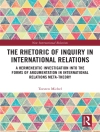Examining the broad contexts of US foreign policy and the lingering aftermath of the Vietnam War, David Ryan argues that these events created an opportunistic framing of 9/11, paving the way for the long-held neo-conservative desire for regime change and war in Iraq.
He examines the construction of the cultural framework for war following 9/11, the legitimacy of military force in Afghanistan, the rise of anti-Americanism, within the broader contexts over the struggle over legitimacy, identity and leadership.
Turning the ‘clash of civilisations’ thesis on its head, Ryan presents a careful analysis of the evolution of US foreign policy and its engagement with Iraq through the 1980s. While 9/11 provided the opportunity, the post-Vietnam context provides a more pertinent framework for this reflection on the Gulf War, the Iraq War and the strategic implications for US foreign policy.
قائمة المحتويات
1. Broad Contexts
2. Framing September 11: Rhetorical Device and Photographic Opinion
3. Orientalism and the Anti-American Sentiment
4. War and Just War: Terrorism and Afghanistan
5. The United States and Iraq: ‘One Can do Nothing About the Past’
6. Iraq and Vietnam: The Unbearable Weight of Defeat
7. The Tipping Point: Between Bring ’em on and Going South
8. Imperial Frustrations
Bibliography
Notes
Index
عن المؤلف
David Ryan is a Senior Lecturer in the Department of History at University College Cork. He is the author of US Foreign Policy in World History (Routledge, 2000) and Frustrated Empire (Pluto, 2007).












